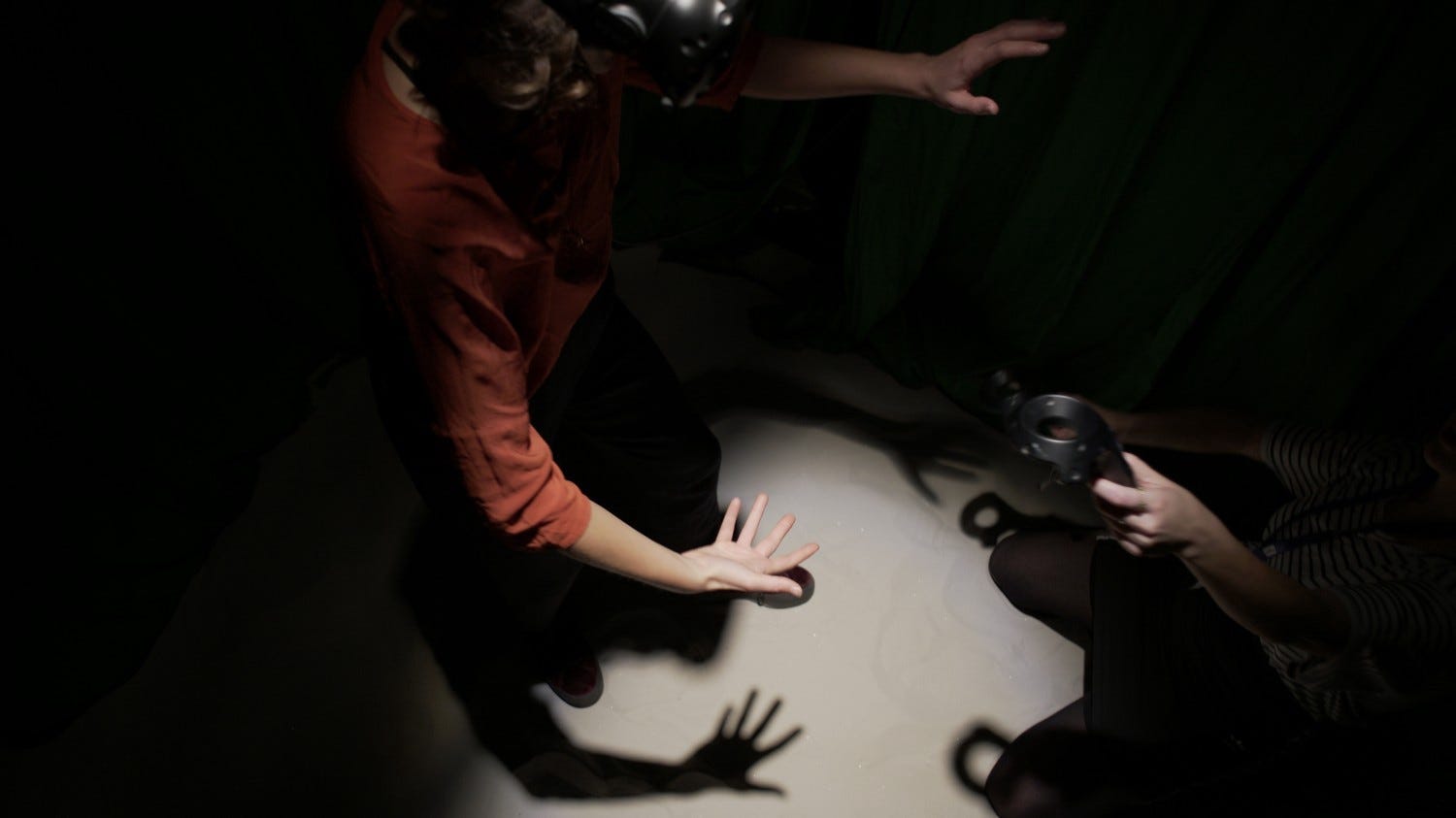
It’s strange, having power over a stranger. She’s standing in a pile of sand, as I am. Green curtains surround us. We’re alone. Except she’s wearing a VR headset and I am not.
I can see her and she can’t see me. We’re inside The Collider, a machine built to decode the mysteries of human relationships. It works by pushing two people together. The collision of particles is much like the collision of strangers.
I hear a voice inside the headphones. It’s serious, British.
She’s telling me that I should now recreate a memory — a moment in time where I had power over someone else — using this stranger’s body. I reach my hand out.
Dare I touch her? And move her body around? I don’t want to startle her.
The voice in the headphones tells me to go ahead. The voice sounds a bit impatient.
What will she think? Does she expect my touch? Does she trust me?
I reach my hand out and start to nudge her backwards, gently; I press down on her shoulders and sit her in a chair.
She trusts me, I think. But why should she? Why would she?
You are invited to enter The Collider — a machine built to decode the mysteries of human relationships.
Like its better known counterpart, the Large Hadron, The Collider sets out to reveal bonds between unique entities. Although instead of particles, this machine hurls people together.
Its mission: to identify and understand the invisible material that passes between people — the corrosive, delightful, and mysterious matter that keeps us together and pulls us apart.
From the outside, it looks like a large white box. Blank.
I enter the installation alone, wearing a set of headphones. My partner enters through a separate door. We each make our way through a series of chambers until we meet in the center of the machine. She is already there when I arrive. She is in the headset, standing perfectly still. I find the VR controllers, as commanded by the voice in my ears. I realize both of us are probably hearing a different disembodied voice through the headphones.
We begin to dance. I’m asked to wave my arms about. She mirrors my actions. I’m asked to go more intense, more extreme, to keep her moving continuously. I’m wary of following the voice; I don’t want to hurt my partner.
How long is this going to go on? I wonder how she is feeling, what she’s thinking.
Am I allowed to speak to her? Could she even hear me if I do?
She keeps trying to get closer to me and I keep stepping back as she invades my personal space. I feel protective of her. And a little afraid.
Then tables turn, and I am asked to mirror her. I attempt to go as quickly as she’s going, moving around the small room. At some point, I get disoriented and turned around. While backwards, I keep trying to emulate her actions until I realize my mistake.
I wonder what she sees in the headset as we dance.
Afterwards, we meet in a debriefing room. There is a menu card designed to help the reticent discuss their shared experience, if they wish. I imagine some people just walk away, disoriented about what’s just transpired. Luckily for me, my partner is just as curious about my experience as I am about hers. How did she know where I was, what I was doing to her? Why did she trust me not to hurt her? Why did she trust me to move her body around?
It is an intense discussion. At various moments, during The Collider, I felt sadness, delight, curiosity, remorse, bewilderment, surprise, frustration, and weight of responsibility for another person’s well-being. The experience of being in the machine is deeply touching in a way that’s hard to articulate.
No two people will enter The Collider and do exactly the same things we did. It is an encounter that can never be recreated. I know that even if I went back into the machine, I’d have a different partner, one who would react differently and make different choices. Perhaps if I entered a second time, I would be the vulnerable one, the one in the headset. The one being controlled, manipulated.
I entered the machine with a stranger. And I left the machine with a __________. But what to fill in that blank? A new friend, compatriot, ally, something else? We are not exactly strangers any more. But we are not exactly good friends; perhaps we may be good friends some day. Yet, we’ve gone through an experience together that few people will understand. And that’s the point.
We’ve been transformed, forever, by the machine.
The Collider runs April 26 — May 4 as part of the Tribeca Film Festival’s Immersive Program. Tickets are sold out.
Read our interview with the creators of this experience.
View all of our Tribeca Immersive 2019 coverage.
NoPro is a labor of love made possible by our generous Patreon backers. Join them today!
In addition to the No Proscenium web site, our podcast, and our newsletters, you can find NoPro on Twitter, Facebook, YouTube, Instagram, in the Facebook community Everything Immersive, and on our Slack forum.
Office facilities provided by Thymele Arts, in Los Angeles, CA.


















Discussion